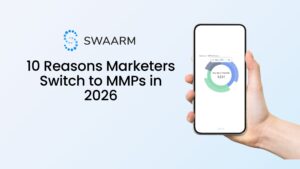In this article, originally published by Financial Express, Yogeeta Chainani, CEO and Co-founder of Swaarm, discusses at length the various startup challenges that founders of SaaS companies face and how they can steer through them to success.
As the third largest startup ecosystem in the world, India spearheads innovative solutions and is strategically positioned to attain worldwide recognition while propelling economic advancement (Source: Nasscom Start-up Report – Momentous Rise of the Indian Start-up Ecosystem). The increasing inflow of cash by leading domestic and foreign investors, rising Internet penetration, and widespread adoption of digital payments are rapidly changing the healthcare, eCommerce, and fintech space in particular. No wonder, the startup tide is on the rise. The Indian landscape witnessed the arrival of over 1300 new tech startups last year itself, raising the overall figure to around 27,000. Additionally, more than 50% of the tech startups grew revenue by 20% last year which will further drive the growth of the segment in 2023 (Source: Nasscom Tech Start-up Report 2022 – Rising Above Uncertainty: The 2022 Saga of Indian Tech Start-ups).
Even though this looks promising, around 2000 startups ended up winding up their business in 2022. While global uncertainties are just one piece of the giant puzzle, the founding team’s inability to meet the changing customer needs is another significant reason for clocks running out for many tech startups. Ironically, around 70% of tech startups typically fail after 20 months of gaining a first round of funding. (Source: CB Insights Research-startup failure post-mortems).
As SaaS-based products are gaining significance, many startup founders are playing it wrong. Let’s understand this a bit in detail.
Photo by Christian Velitchkov on Unsplash
Founders need to not only choose the right problem to solve but also know the problem in and out before investing resources into SaaS product development. Often the core team devotes the majority of its energies to building the solution rather than focusing on the problem- which keeps them away from having a thorough understanding of the core challenges being faced by their potential clients. In many cases, this very phenomenon keeps their product from attaining market fit. By deep diving into market challenges at the very start, founders can eliminate any conscious bias for the product they want to build. Additionally, they can keep product development on track during the initial stages and ensure that the solution is fit to be launched.
Founders should work on prototypes and make multiple iterations to create an appealing solution. Every SaaS founder has a strong intuition about creating a solution. However, without undertaking real 1:1 customer conversations and user research, the focus on product development and innovation will not be geared towards a concrete goal. It is important to invalidate product features initially, determine whether it is a problem fit, and then invest time and resources.
Photo by Brooke Cagle on Unsplash
We saw that many marketers were spending the majority of their time cleaning and analysing data instead of focusing on important aspects of strategy, planning and creativity. This realisation inspired me and my co-founder to build our tech startup with the aim of providing a solution that would enable customers to automate repetitive tasks and thrive on data-driven decision-making. Dealing with a problem in the past acts as a stepping stone and helps sense users’ breaking points further. Taking a step back and studying the origins or continuously revisiting and hypothesizing can be frustrating, but it helps deeply to understand unmet customer needs and to develop the right solution.
A non-negotiating trait (if I could say so!) is for the founders to be persuasive- passion is the key ingredient. I believe that a founder needs to have a personal conviction to eliminate the core challenges. Only then can he/she accurately mobilize resources and pursue challenging goals. The cherry on the cake is having a co-founder or team with the same passion and dedication to develop a truly compelling solution.
A compelling product should be a truly innovative one. Undoubtedly, the SaaS ecosystem proves to be fiercely competitive, demanding founders to concentrate on crafting a product that not only embodies uniqueness but also remains at the cutting edge of genuine innovation, serving as an indispensable tool for enhancing efficiency. So, if the product does not offer efficiency in any form to customers, founders should go back and re-look into the underserved opportunity. However, many founders tend to lose perspective in the quest to develop a problem-solving product. Ultimately, the motive of any startup is to earn money and grow, so founders need to ask whether the problem is big enough to create a solution that boasts of scalable opportunities. They can get overwhelmed by their problem-solving passion and ignore critical aspects of scaling a business.
The key here is to find a balance and use actual user experience data to get the right answer to questions and a clear perspective. Learning the pain points of our customers’ day-to-day operations helped us understand that they needed an innovative yet affordable performance marketing tool to drive optimized and accurate marketing campaigns.
By keeping all these things in mind, SaaS founders can meet investor expectations. Investors look for passionate founders, a proof of concept that the product solves the problem, a large enough market to scale business and operations, and a unique or competitive product. Besides, they also expect founders to have a quantified business model that helps convert the product into a viable enterprise. Additionally, investors look for operational control to ensure funding doesn’t go to waste.
SaaS founders can create an impact by developing products that offer value. They should understand the product’s impact on the user, the company, and the overall SaaS ecosystem. A strong product and company strategy can help founders scale their businesses and grow in a competitive SaaS landscape.
This article was originally published in Financial Express!





